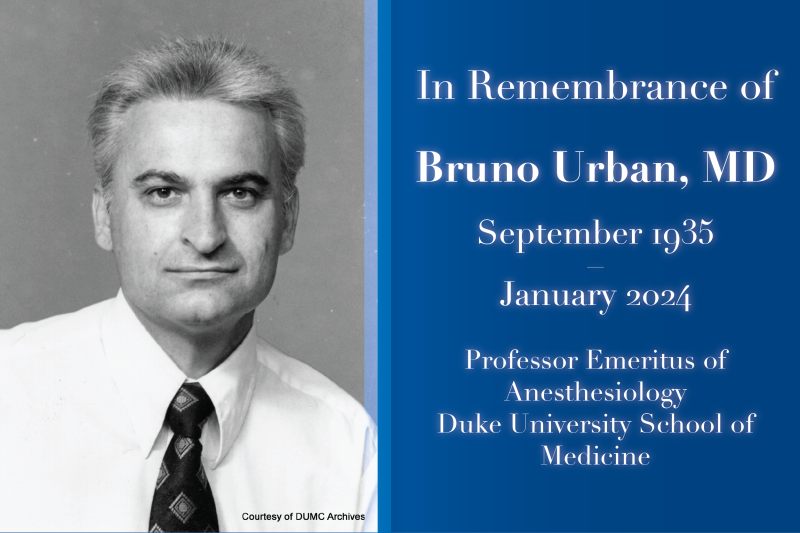
It is with profound sadness that we inform you of the passing of a beloved member of our Duke Anesthesiology family and esteemed anesthesiologist, Bruno Urban, MD. He passed away in January of this year.
Dr. Urban, a professor emeritus of anesthesiology for more than two decades, will be remembered as a pioneer in our field for advocating an integrated, multidisciplinary approach to pain management that transcended traditional specialty boundaries.
Dr. Urban, born in Czechoslovakia, received his medical degree from Albertus Magnus University in Cologne, Germany. He then completed three years of training in surgery in Remscheid, Germany. He emigrated to the United States in 1963 and completed an internship at Muhlenberg Hospital in Plainfield New Jersey, followed by a residency in anesthesiology at SUNY Downstate Health Sciences University. He joined the faculty there in 1966, and in 1972 was recruited to Duke by Dr. Merel Harmel, the founding chairman of our department. Dr. Urban's distinguished career encompassed a range of specialties. Proficient in neurosurgical anesthesiology, regional anesthesiology, and the treatment of pain, Dr. Urban served as the section chief for neuroanesthesiology before redirecting his focus towards advancing the field of chronic pain management, which he accomplished on multiple levels.
In 1974, Dr. Urban became the first dedicated pain management specialist within Duke Anesthesiology and founded the Duke Pain Medicine Clinic, an innovative effort that resulted in one of the nation's first multidisciplinary pain clinics. By combining the expertise of physicians trained in anesthesiology, psychiatry, and neurosurgery, the Duke Pain Medicine Clinic, the first in the Southeast, adopted a comprehensive, collaborative, multidisciplinary approach to pain management, including psychiatric, neurosurgical and neurostimulation techniques. A former colleague described Dr. Urban as being ahead of his time. Dr. Urban’s areas of focus included the psychological characteristics of pain patients, the impact of age and gender on pain description, somatostatin concentration in cerebrospinal fluid, and chronic pain. A true trailblazer, Dr. Urban's background in neurosurgery led him to adopt and advance techniques of spinal cord stimulation in the 1970s. He proudly claimed the distinction of being the first to prescribe methadone for pain in the state of North Carolina. Dr. Urban's contributions extend beyond outpatient care, as he also developed Duke's multidisciplinary inpatient pain program—one of the first such programs in the country. When the department's Pain Medicine Division was established in 1999, Dr. Urban served as its first chief. He also assumed the responsibility of serving as the first director of Duke's Pain Medicine Fellowship. Throughout his influential career, Dr. Urban imparted his extensive knowledge and expertise to countless residents and fellows, emphasizing the importance of anatomy and pharmacology in the field of pain management. He retired from clinical practice in 2000.
In recognition of Dr. Urban's remarkable contributions, our department established the distinguished Bruno Urban Lectureship. Each year, we have the privilege of hosting a national leader in pain medicine to deliver this esteemed lecture series in his honor.
Most importantly, Dr. Urban's legacy will live on through his family. He was a dedicated and loving husband to his wife, Ingeborg, and proud father to his son, Thomas Urban, and daughter, Katharina Robinson, who shared with us this memory: “My favorite anecdote about my father that I feel represents him best is when we lived in New York, my father helped to establish a daycare center for hospital employees. He believed that employees could work with greater focus and peace of mind if their children were well tended and nearby. This stands out to me because my father had no need for these services for his own family as my mother remained at home to care for us. He advocated for causes because they were the right thing to do, not for personal gain. I didn’t hear this story from him until well after his retirement, and it impressed upon me his selflessness.” She also shared that he believed so strongly in education that he chose to remain at Duke University throughout his career so he could teach and pass his knowledge to the next generation of physicians.
Please join us in extending our sincerest condolences to Dr. Urban's family, friends and colleagues. Duke flags will be lowered on March 11 in honor of his life and legacy.